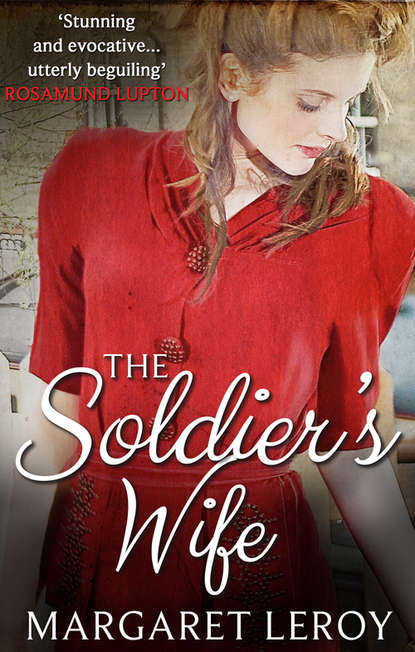По всем вопросам обращайтесь на: info@litportal.ru
(©) 2003-2024.
✖
The Soldier’s Wife
Настройки чтения
Размер шрифта
Высота строк
Поля
‘Evelyn, if we’re going, it has to be today. They’re sending a boat from Weymouth. But after today there may not be any more boats. It’s too dangerous.’
‘It’s not very helpful of them, is it? To rush us all like this? They have no consideration, Vivienne.’
‘The soldiers have left,’ I tell her. ‘There’s no one here to defend us …’
I don’t say the rest of the sentence: And the Germans could walk straight in.
‘Oh,’ she says. ‘Oh.’ And then, with a light coming suddenly into her face, the look of one who has found the answer: ‘Eugene should be here,’ she says.
‘Eugene’s away fighting, remember?’ I say, as gently as I can. ‘He went to join the army. He’s being very brave.’
She shakes her head.
‘I wish he were here. Eugene would know what to do.’
I put my hand on her wrist, in a gesture of comfort that’s empty, utterly futile—because what solace can I offer her when the son she adores has gone? I feel how frail she is, her limbs thin and brittle as twigs. I don’t say anything.
I make the girls their breakfast toast. I’m looking around me, aware of all the detail of my kitchen—the tea-towels drying in front of the stove, the jars of raisins and flour. On the wall there’s a print by Margaret Tarrant, a Christening present from Evelyn for Blanche—the Christ Child in his crib, with angels all around. It’s a little sentimental, yet I like it, for the still reverence of the angels, and the wonderful soft colour of their tall fretted wings that are the exact smoky blue of rosemary flowers. I wonder if I will ever see these things again—and if I do, what our life will be like, in that unguessable future. I say a quick prayer to the angels.
The girls come down to the kitchen, bleary, smelling of warm bedclothes, rubbing the sleep from their eyes. Alphonse sidles up to Millie and walks in small circles round her. She bends down to stroke him, the morning sun shining on her dark silk hair, so you can see all the reddish colours in it.
‘Right, girls. We’re going,’ I tell them. ‘We’ll get the boat today. It’ll take us to Weymouth and from there we’ll take the train to London and stay with Auntie Iris. I put our names on the list last night.’
Blanche’s face is like a light switched on.
‘Yes.’ There’s a thrill in her voice. ‘But you could have decided earlier, Mum, then I could have washed my hair.’
‘You’ll have to pack quickly,’ I tell them. ‘As soon as you’ve finished breakfast. You’ll need underwear and your toothbrushes, and all the clothes you can fit in.’
I’ve put out a carpet bag for Millie, and for Blanche a little leather suitcase that was Eugene’s. Blanche looks at the suitcase, appalled.
‘Mum, you’re joking.’
‘No, I’m not.’
‘But how can I possibly get everything in there?’
London to Blanche is glamour—I know that. We went to stay with Iris for a holiday once—when Blanche was six, four years before Millie was born. Ever since that holiday, London has been a promised land to her, a dream of how life could be, ought to be. Once it was a dream of Trafalgar Square, with its dazzling fountains and pigeons, of the Tower of London, of seeing the chimps’ tea-party at the zoo. But now that she’s almost a woman, it’s a dream of men in uniform—resolute, square-jawed, masterful—and tea in the Dorchester tea-room under a glittery chandelier: a dream of cakes and flirtation, with maybe a swing band playing Anything Goes. She wants to take all her very best things, her nylons, her coral taffeta frock, her very first pair of high heels that I bought for her fourteenth birthday, just before she left school. I understand, but I feel a flicker of impatience with her.
‘You’ll have to, Blanche. I’m sorry. There won’t be much room on the boat. Just put in as many clothes as you can. And you’ll need to wear your winter coats.’
‘But it’s hot, Mum.’
‘Just do your best,’ I say. ‘And, Blanche, when you’ve finished, you can give Millie a hand …’
‘No, she can’t. I can do it myself,’ says Millie.
She’s been drinking her breakfast mug of milk, and her mouth is rimmed with white. She bites languidly into her toast and honey.
‘Of course you can, sweetheart. You’re a big girl now,’ I tell her. ‘But Blanche will help you. Just be as quick as you can, both of you. If we’re going to go, it has to be today …’
I watch them for a moment, Blanche with her sherbet-fizz of excitement, Millie still fogged with sleep. We’ve come to the moment I’ve been dreading.
‘There’s one thing that’s very sad, though,’ I say. ‘We’ll have to take Alphonse to the vet’s.’
Millie is suddenly alert, the drowsiness all gone from her. Her eyes harden. She gives me a wary, suspicious look.
‘But there’s nothing wrong with him,’ she says.
‘No. But I’m afraid he needs to be put to sleep.’
‘What d’you mean, put to sleep?’ says Millie. There’s an edge of threat in her voice.
‘We have to have him put down,’ I say.
‘No, we don’t,’ she says. Her face blazes bright with anger.
‘Millie, we have to. Alphonse can’t come with us. And we can’t just leave him here.’
‘No. You’re a murderer, Mummy. I hate you.’ Her voice is shrill with outrage.
‘We can’t take him, Millie. You know we can’t. We can’t take a cat on the boat. Nobody will. Everyone’s taking their cats and dogs to the vet. Everyone. Mrs Fitzpatrick from church was taking their terrier yesterday. She told me. It was terribly sad, she said, but it had to be done …’
‘Then they’re all murderers,’ she says. ‘I hate them.’ Her small face is dark as thunderclouds. Her eyes spark. She snatches Alphonse up in her arms. The cat struggles against her.
‘Millie. He can’t come with us.’
‘He could live with someone else, then, Mummy. It isn’t his fault. He doesn’t want to die. I won’t let him. Alphonse didn’t ask to be born now. This war is stupid,’ she says.
Suddenly, it’s impossible. All my breath rushes out in a sigh. I can’t bear to distress her like this.
‘Look—I’ll speak to Mrs le Brocq,’ I say wearily, defeated. It’s as though the room breathes out as well, when I say that. But I know what Evelyn would say—the thing she’s said so often before: You’re too soft with those girls, Vivienne … ‘I’ll see what I can do,’ I tell them. ‘Just get yourselves packed up and ready to leave.’
CHAPTER 4 (#ulink_471504e8-a848-537c-84b1-a3be895dab99)
I walk with Evelyn to Angie’s house, up one of the narrow lanes that run the length and breadth of Guernsey, their labyrinthine routes scarcely changed since the Middle Ages. High, wet hedgebanks press in on either side of the lane; red valerian grows there, and toadflax, and slender, elegant foxgloves, their petals of a flimsy, washed-out purple, as though they’ve been soaked too long in water. I have Alphonse in a basket, and a bag of Evelyn’s clothes.
The climb exhausts Evelyn. We stop at the bend in the lane, where there’s a stone cattle-trough, and I seat her on the rim of the trough to catch her breath for a moment. Sunlight splashes through leaves onto the surface of the water, making patterns that hide whatever lies in its depths.
‘Is it much further, Vivienne?’ she asks me, as a child might.
‘No. Not much further.’
We come to the stand of thorn trees, turn in at the track to Les Ruettes. It’s a solid whitewashed farmhouse that’s been here for hundreds of years. There’s an elder tree by the door: islanders used to plant elder as a protection against evil, lest a witch fly into the dairy and the butter wouldn’t form. Behind the house are the glasshouses where Frank le Brocq grows his tomatoes. Chickens scratch in the dirt; their bubbling chatter is all about us. Alphonse is frenzied at the sight and smell of the chickens, writhing and mewing in his basket. I knock at the door.
Angie answers. She has a headscarf over her curlers, a cigarette in her hand. She sees us both there, and a gleam of understanding comes in her eyes: she knows I have made my decision. Her smile is warm and wide and softens the lines in her face.
‘So. You’ve made your mind up, Vivienne.’









